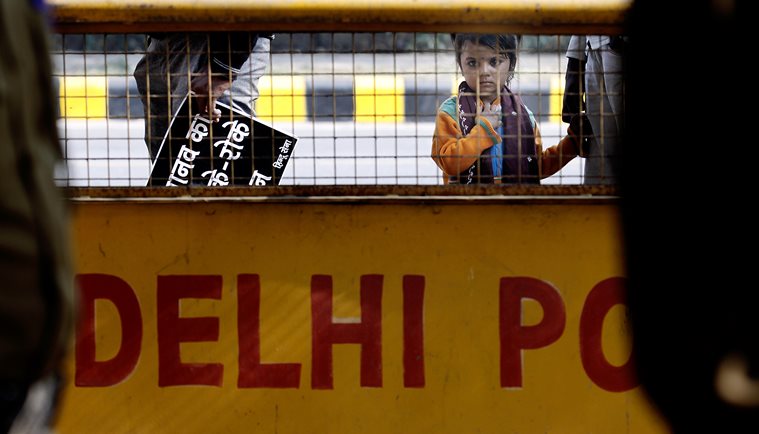
On 28 May 2011, in Raigarh district of Chhattisgarh, two activists, Ramesh Agrawal and Harihar Patel, were arrested by the state police. Another activist, Rajesh Tripathi, went underground fearing imminent arrest. The trio, along with others, through their organisations—Jan Chetna and Adivasi Mazdoor Kisan Ekta Sangthan – were involved in creating awareness about human and environmental rights issues, training grassroots workers, organising communities and fighting cases of human rights violations in Raigarh in court. They were, and continue to be, on the forefront of opposing land grabs, demanding implementation of laws like the PESA (Panchayats Extension to Scheduled Areas) Act and Forest Rights Act, and ensuring that free prior and informed consent is taken from indigenous communities before their land is acquired for industrial or other ‘public’ purposes.
The police accused the activists of ‘circulating defamatory material’, ‘disrupting public order’ and ‘causing alarm and panic among the public’ during a public consultation organised at Tamnar village earlier that month. A few days later, while in judicial custody, Ramesh Agrawal, who suffers from hypertension, was chained to a bed in a government hospital. The activists were later released on bail. But this was not the end for Agarwal and his colleagues. A year later, in July 2012, Agrawal was attacked by unidentified assailants and shot through the thigh. Though he survived the attack, he is yet to recover fully from it.
The cases against the trio are still pending, and appear unlikely to be resolved in the near future, as the trial drags on. Legal experts say the cases have no basis, and are meant only to harass and intimidate human rights defenders working for the rights of Adivasi, Dalit and other marginalised groups.
Unfortunately, Agrawal, Patel and Tripathi’s cases are only the tip of the iceberg. Human Rights Defenders (HRDs) of different kinds – activists, lawyers, journalists, trade unionists – face real threats to life and liberty from state and non-state actors even today. Take the recent case of schoolteacher-turned-activist Degree Prasad Chouhan. On 26 August, three policemen visited Chouhan’s home in Raigarh and told his wife that they had received a complaint against him. Chouhan was not at home at the time. The next day, after receiving repeated calls from the police, he went to the local police station only to be told that PUCL (People’s Union of Civil Liberties, one of India’s oldest and most prominent human rights organisations) was a ‘naxal organisation’. And that he had ‘naxal’ literature and attended their meetings, and was therefore a Naxalite himself. When Chouhan asked about the basis of the allegations, the police showed him an anonymous letter. His request for a copy was turned down.
Chouhan was not arrested or detained, and the police did not register a formal complaint against him. Nevertheless, he was asked to stop his work. Chouhan, who is Dalit, is associated with People’s Union of Civil Liberties (PUCL) and Chhattisgarh Bachao Andolan (CBA), and has been documenting cases of human trafficking and atrocities against Dalits in the region for years, apart from campaigning for the rights of Adivasis. He says he has been targeted because of his sustained activism.
Notably, neither the ‘anonymous complaints’ against individuals and organisations, nor the threats of detention are new for HRDs. In Chhattisgarh, anonymous complaints were filed against the Jagdalpur Legal Aid Group, a group of lawyers, some months ago. Adivasi activist Soni Sori and her nephew Linga Ram Kodopi have been threatened that their bail could be cancelled anytime.
The cases of Journalists Santosh Yadav and Somaru Nag, who were arrested in September and July this year, from Bastar in Chhattisgarh for allegedly supporting Maoists, are also cases in point. A number of similar cases can be cited from different parts of the country. According to the Human Rights Defenders Alert India (HRDA-India) this year alone (January-November) 92 such cases have been reported with the National Focal Point for Human Rights Defenders at the National Human Rights Commission (NHRC). HRDs working in central India and elsewhere often have to face a hostile environment, along with limited access to information, redressal mechanism and lack of institutional support.
All this only substantiates what the United Nations (UN) Special Rapporteur on the situation of HRDs had to say about the state of human rights defenders in India a few years back. After her official visit in 2011, the Special Rapporteur, Margaret Sekaggya said, “I am troubled by the branding and stigmatisation of human rights defenders, who are labeled as “Naxalites (Maoists)”, “terrorists”, “militants”, “insurgents”, “anti-nationalists” or “members of underground”. Defenders on the ground, including journalists, who report on violations by State and non-State actors in areas affected by insurgency, are targeted by both sides.” Regrettably, much has not changed over the years. If anything, things have gotten worse.
And this, despite the fact that India in 1998 was among the countries which supported the UN Declaration on Human Rights Defenders. While it is reassuring that the National Human Rights Commission has a dedicated focal point for HRDs, the focal point has not been proactive in playing any important role in defending the defenders. Every year, on the 9th of December, the NHRC chairperson issues a message reiterating a pledge to promote and protect the rights of HRDs. But this amounts to little action on the ground. The time has come for the NHRC and State Human Rights Commissions to proactively recognise, promote and protect HRDs and create an enabling environment for defending human rights.
On 25 November, India welcomed and voted in favor of a resolution on HRDs at the UN General Assembly Third Committee meeting. The real issue now is how our government will fulfill its promises. Lip service to human rights abroad won’t keep defenders from getting arrested, threatened or shot at home.
- See more at: http://indianexpress.com/article/blogs/nhrc-must-create-enabling-environment-for-defending-human-rights/#sthash.BI8uqjff.dpuf
Leave a Reply